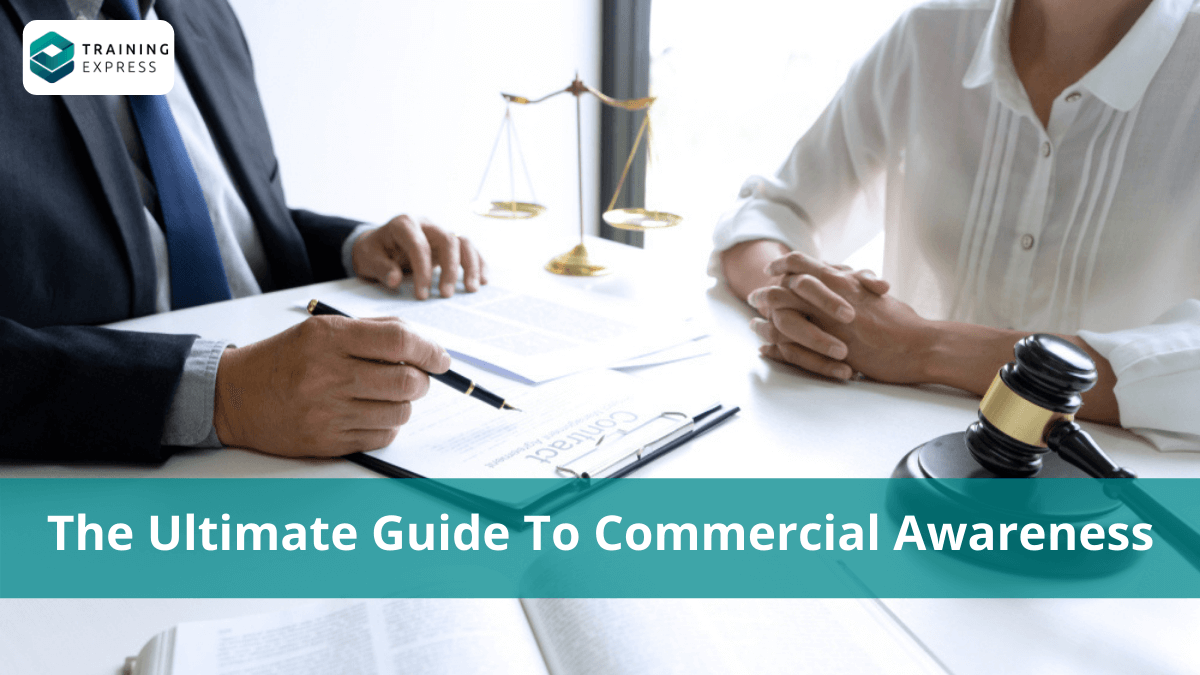
Are you trying to gain a training contract in a law firm? Or perhaps you’ve applied for a job, but you lack the commercial know-how about the company. You need to have commercial awareness to perform better in the interviews and the job itself.
Legal recruiters greatly emphasise commercial awareness because a good deal of legislation today revolves around business and commerce in the marketplace, across cities and nations and beyond geographies. And so, commercial awareness is one of the key requirements that a competent solicitor needs to master.
However, becoming commercially aware doesn’t happen overnight. It requires continuous development over time.
What is commercial awareness?
Commercial awareness is a dynamic and ever-changing concept. It refers to the knowledge about current deals and issues in the business world that might concern a client. Moreover, the commercial lawyers must have an awareness of the operating grid in which the business is operated. Because it’ll show how their legal advice can impact the company of the client.
As a matter of fact, having commercial awareness means you’ll be able to adapt and adopt changing business acumen. And this is considered one of the critical characteristics of any good solicitor or top-rated law firm.

So, Commercial awareness means to:
- Stay informed on what is happening in the world of business.
- Have an understanding of how the law is being applied to the commercial world.
As an illustration, commercial awareness is essential for both the employees and commercial law solicitors. Because employers particularly look for employees who have:
- Commercial awareness
- An understanding of the law
- Knowledge of business and the market.
To put it another way, if you are a law student, you need commercial awareness. It’ll help you to stand out from the other candidates applying for the same role as commercial solicitor. However, commercial awareness doesn’t mean only to read the business news, get as much information as possible and repeat what you’ve read. You also need to demonstrate it by showing that:
- You understand the business aspects, and you can form an opinion.
- You are not repeating the facts. Instead, you actually perceive commercial awareness as your way of thinking.
In all aspects of the legal world, employers are looking for employees who have :
- Ambition and intelligence for working in a fast-paced environment.
- Willingness to work extremely hard and put long hours into their job.
- Intense research skills.
- The ability to maintain client relationships to gain business for the company.
Who needs commercial awareness?
In the modern corporate world, everyone from public sectors to volunteers and charity workers needs to have commercial awareness. Because the employees need to stay up to date with the latest industrial news and changes in the related sectors.
Moreover, in law firms, solicitors need to provide their clients legal advice as per their objectives. So, they need to understand the corporate world too.
For the most part, if the employees and the trainee solicitors have commercial awareness, it will ensure profitability for both the company and the law firms respectively.
Why is commercial awareness important?
Commercial awareness is such a sought after skill that for many aspiring lawyers, it can distinguish between becoming and not becoming a lawyer. Because clients expect their lawyers to:
1. Have in-depth knowledge of how a business is run.
2. Know the factors for profitability and growth.
3. Understand how to make optimal use of the resources available.

Solicitors offer their clients legal advice and assistance on issues regarding economic, social and political events. To point out, clients may know a lot about their business, but they are not experts in the law. And this is where the solicitors come in.
A solicitor’s job is to provide legal expertise and match up to their clients’ knowledge to gain an in-depth understanding of their business.
How to get commercial awareness?
Commercial awareness is necessary if you want to succeed in the legal profession in today’s world. And work experience is probably the most practical way to gain it. Working in any kind of job will provide you with an insight into:
- How businesses are conducted.
- What factors contribute to success or failure.
- How to make use of the resources to the best extent possible.
- What will be the bottom line outcomes?
Even if you do some sort of internships during your summer holidays at companies in an industry segment you are interested in, it’ll add weight to your CV.
So, below is a list of ways you can get commercial awareness.
1. Read useful and relevant resources.
2. Become familiar with useful commercial information.
3. Find resources that seem relatable and straightforward to you.
4. Try to understand the concepts being talked about.
5. Don’t try to learn and regurgitate back big chunks of information.
6. Undertake any form of work experience.
7. Think about what you already know from your experiences.
8. Consider your employment history and see if you can identify any previous examples of commercial work experience.
9. Participate in the discussion forums and industry-specific business clubs.
10. Attend lectures and seminars focusing on business and commerce.
11.Collaborate with various kinds of business professionals on a daily basis.
Resources for developing commercial awareness
To view things from a business person’s perspective and develop a more connected understanding, you need to build genuine interest and a knack for spotting themes and trends. In addition, you should get yourself into a routine and stick to it. Below are some excellent places to start learning.

- The Financial Times. A British daily newspaper that focuses on worldwide business and economic current affairs. Published digitally and also carried sector-based supplements.
- The Times. A British daily newspaper based in London. Provides UK and world news. It also carries a Law Supplement of Thursdays.
- The Guardian. Offers global and UK specific news, including current affairs coverage from across the UK.
- The Daily Telegraph. A national British daily based in London. Offers UK and world news.
- CNN. US-based news but also covers world affairs and international news.
- The Economist. An international weekly newspaper, printed digitally, that offers particular sector-based articles. Suitable for a brief news report.
- Reuters. It’s a Canada-based newspaper. Covers the latest news from around the world. Also, it includes breaking news in markets, business, politics, technology and so on.
- South China Morning Post. Useful for an overview of Asian markets.
- The Wall Street Journal. An American business-focused international daily newspaper that offers detailed banking news and analysis of global markets.
BBC News Online. Contains international news coverage along with British, entertainment, science and political news.
Why is commercial awareness important in law?
A commercial solicitor needs to have the knowledge and understanding of the business world to relate their legal advice to their client’s interests. And to ensure this, the law firms invest a significant amount of money in each trainee solicitor.

Assessing the commercial awareness of the applicants is a crucial way to ensure that future trainees will be able to provide legal advice in the light of the client’s needs. This is why a part of the training contract interview and application form is focused on indicating such awareness.
There are a few other reasons why commercial awareness is crucial in law firms.
1. Clients want commercial, not academic answers to their legal problems
Clients generally expect a confident response to their legal issues, and they may not be too intent on how they reached that answer. Therefore, as a commercial solicitor, you need to show that you are both bright and commercially astute in your legal approach to the client’s problems.
2. Commercial awareness is about understanding how a law firm operates
A commercial solicitor must understand how the law firm works as a business. Apart from providing advice to the clients, the solicitors should perceive what’s important to the firm.
Like all other businesses, a law firm needs to keep a careful eye on its profitability and cash flow. And the interview panels expect to hear an appreciation of these while recruiting new trainee solicitors.
3. Commercial awareness helps in the role of a trainee solicitor
Trainee solicitors must make an effort to read around the subjects the firm works on. Correspondingly, they should monitor the press around key clients and build their broader knowledge instead of getting entirely bogged down in trainee tasks. In short, it’ll make the job more interesting for the trainees. Furthermore, it’ll enable the law firm to get them involved in more exciting work.
4. It’s not about knowledge; it’s a way of thinking
Many law students often think that commercial awareness is all about fact-learning. Instead, commercial awareness is a way of thinking that involves:
- Having genuine interest and intrigue in the profession and the market it operates.
- Understanding the business aspects of a law firm.
Some law firms assign their trainee solicitors to business development within the firm. This particular task requires them to go to client events and marketing events. And going on client secondment not only gives the trainees new job experience but also a good insight into the commercial world.
5. To understand the client’s objectives
Solicitors must think about the client, and any legal advice they provide must be commercially focused. Because only by knowing the law won’t get this job done. A solicitor has to understand the client’s intentions and must conform to those objectives.
Therefore, it’s crucial to understand the setting within which the clients want advice before beginning any research.
6. To find aspects of the commercial world that interest you
If you want to apply to a City law firm that tends to do commercial work, you have to have a good understanding of the commercial world. But this doesn’t mean you need to have studied business or economics.
After all, if you just have an interest in business, finance and the broader world, you can quickly grasp the critical information you need and be prepared for any topical questions at interviews. Because it can be as easy as reading the ‘Financial Times’ or any other business newspapers.

Keep in mind that nobody expects a trainee solicitor to understand all the details of a complex transaction process. However, if you have an understanding of the corporate world, you’ll be of more value to the firm. So, find an area that genuinely interests you in the business sector.
Conclusion
Commercial awareness is more than just knowing what was on the front page of the newspaper today. It’s about understanding businesses and knowing the right kind of information to consider. If someone approaches you for advice on a business opportunity or an issue, you need to be ready to help them with it.
Read more on our blog
- A Comprehensive Guide to Dementia Symptoms and Stages
- How to Clean an Oven? Easy, Effective, and Natural Ways
- What Color Tubes Are Used For Which Tests in Phlebotomy?
- Can You Reheat Chicken? Safe Methods, Tips, & Best Practices
- What Not To Say To Occupational Health UK
- How Many People Does A Sheet Cake Feed?
- Why Is Health and Social Care Important? A Complete Guide
- How Long Does an NVQ Take to Complete?
- What Is a Generational Equity Lawsuit? A Complete Guide
- What is the highest food hygiene certificate?
- Available Courses
- Animal care10
- Design28
- Training9
- Accounting & Finance Primary49
- Teaching & Academics Primary37
- Teaching23
- Quality Licence Scheme Endorsed171
- Law10
- IT & Software229
- Job Ready Programme52
- Charity & Non-Profit Courses28
- HR & Leadership4
- Administration & Office Skills4
- Mandatory Training36
- Regulated Courses4
- AI & Data Literacy24
- Health and Social Care290
- Personal Development1621
- Food Hygiene117
- Safeguarding79
- Employability287
- First Aid73
- Business Skills293
- Management425
- Child Psychology40
- Health and Safety528
- Hospitality28
- Electronics31
- Construction62
- Career Bundles201
- Marketing39
- Healthcare172

 Food Hygiene
Food Hygiene Health & Safety
Health & Safety Safeguarding
Safeguarding First Aid
First Aid Business Skills
Business Skills Personal Development
Personal Development
